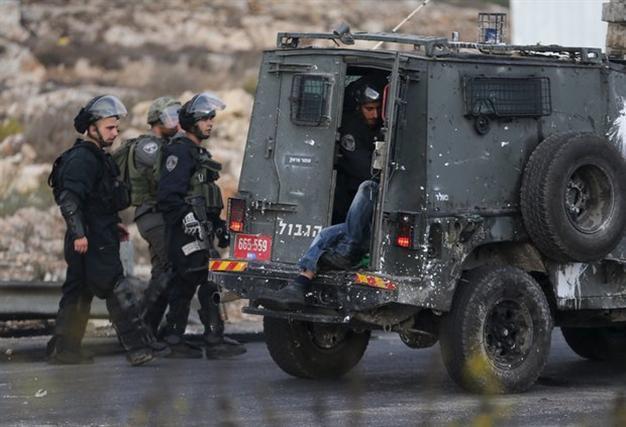Gunman kills Israeli soldier as diplomats seek calm
JERUSALEM - Agence France-Presse

Israeli policemen detain a Palestinian protester during clashes near the Jewish settlement of Bet El, near the West Bank city of Ramallah October 18, 2015. REUTERS photo
Israel was to voice its opposition Oct. 19 to French proposals to send international observers to Jerusalem's Al-Aqsa mosque compound, the latest in a diplomatic push to quell fears over a full-blown Palestinian uprising.
The international efforts follow more than two weeks of near-relentless violence that has seen 41 Palestinians killed, including alleged assailants, while eight Israelis have died. Most of the attackers have been young Palestinians wielding knives and believed to be acting on their own.
In the latest unrest, an Israeli soldier was killed on Oct. 18 in a shooting at a bus station in the southern city of Beersheba, the first such attack after a day in which violence seemed to somewhat ebb.
Police said a man, thought to be Palestinian, entered the bus station armed with a pistol and knife, killing the soldier and wounding 10 other people, including four officers.
The gunman himself was then killed and an African bystander was shot by security forces who mistook him for a second gunman.
The identity of the assailant was not immediately known, and there was no claim of responsibility for the attack.
But it was praised by militant groups in Gaza, with Hamas calling it a "natural response" and Islamic Jihad saying it was a "normal answer to Israeli crimes".
Diplomatic moves to halt the more than two weeks of unrelenting violence gained steam, meanwhile, with US Secretary of State John Kerry saying he planned to meet both the Israeli and Palestinian leaders in the coming days.
Israeli Prime Minister Benjamin Netanyahu, meanwhile, rejected an idea from France that would see international observers sent to the Al-Aqsa mosque compound.
Clashes at the compound between Israeli police and Palestinian protesters in September preceded the current wave of violence.
Muslims fear Israel will seek to change rules governing the site, located in Israeli-annexed east Jerusalem.
The site is sacred to Muslims and Jews, who refer to it as the Temple Mount. Jews are allowed to visit but not pray there to avoid provoking tensions, and Netanyahu has said repeatedly he has no intention of changing the rules.
France's ambassador was summoned to the Israeli foreign ministry for 0730 GMT Oct. 19 over the resolution, French and Israeli diplomatic sources said.
Elsewhere, clashes also broke out in the West Bank city of Hebron, where three attacks occurred on Oct. 17, while on the Gaza border, three Palestinians were moderately wounded by small calibre bullets during clashes with Israeli forces Oct. 18 after they tried to breach the border fence.
Checkpoints have been set up in Palestinian areas of east Jerusalem, where many of the attackers have come from, and some 300 soldiers on Sunday began reinforcing police.
Israeli police also began erecting a wall between the Palestinian village of Jabel Mukaber and Jewish neighbourhood Armon Hanatziv to protect it from firebomb and stone attacks.
Tel Aviv authorities have barred cleaning and maintenance employees from schools during times when students are present, with parents concerned over possible attacks against children.
Violent protests have also erupted in east Jerusalem, the occupied West Bank and the Gaza Strip.
Israel on Oct. 18 closed the only civilian crossing from Gaza into Israel, except for humanitarian cases, while damage was being repaired.
In yet another sign of tensions, ultra-Orthodox Jews illegally visiting a West Bank site holy to them were assaulted by Palestinians, two days after Palestinians torched the site.
The group of about 30 religious students from Jerusalem had travelled to Joseph's Tomb in the northern city of Nablus despite not having the required authorisation from Israel's military.
They told police they intended to repaint the shrine after the fire.
Israeli authorities said Palestinian police beat at least some of them with their batons and the butts of their guns.
A group of Palestinian civilians arrived afterwards and also beat them, according to Israeli police.
Joseph's Tomb, inside a compound in the Palestinian refugee camp of Balata in Nablus, has been the scene of recurring violence between Israelis and Palestinians.
The shrine is under Palestinian control and off-limits to Israelis except on escorted trips organised by the army.
